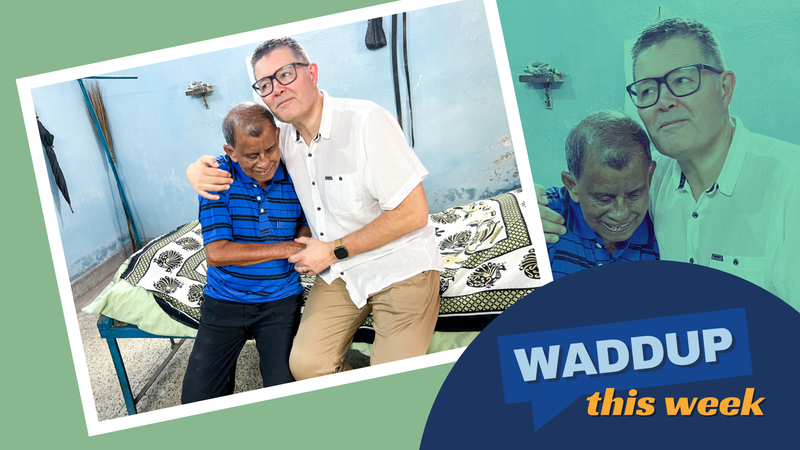Finding a love that was once lost
Peter Waddup, CEO - The Leprosy Mission Great Britain
After finding and curing people's leprosy, our work is about transforming broken lives. Through the kindness of people in the UK we have seen people in Asia and Africa blossom. Sadly, we are not able to fix everything. We cannot make limbs grow back or make a spouse who has deserted a partner with leprosy return. But through people’s generosity and the skills of our staff overseas, we can do so much!
Providing a wheelchair to a single mum disabled by leprosy and confined to the home is lifechanging. She no longer needs to shuffle around on her bottom preparing meals and caring for her young family. Her comfort and dignity are restored. Using a wheelchair even gives her the confidence to face the world outside again.
I have sat with young people in our hospitals whose bodies have been wrecked by leprosy. But where their situations once seemed hopeless, with specialist care, lives have been turned around. I have even seen a young lady who was left with no fingers at all because of leprosy, now make a living by selling her handicrafts. The resilience of human beings really is something to behold. It took some technical expertise to help this lady to relearn her needlework skills. And a whole load of determination and patience on her part. But she succeeded!
But what do we do if a person is elderly or simply too disabled to earn a living? In societies without the safety net of welfare benefits, I have met elderly people banished to the goat shed and fed scraps. This is all because they are visibly scarred by leprosy. They are seen as both cursed and utterly useless. This is completely heartbreaking for anyone to witness.
A person's worth is not dependent on what they do or can accomplish in life. This is the old adage of being a 'human DOing' as opposed to a 'human BEing'. As a Christian, I believe God deeply loves each and every person he has uniquely made. And therefore we are called to show others love and that they are valued.
In India, we run four Snehalayas - the Hindi word for 'house of love'. I am always so moved to visit these amazing places and meet the incredible staff who run them. They love and care for elderly people who have been rejected and ostracised because of leprosy. It is more than a job for this wonderful team, it is a calling and it is beautiful to see. They know that many of the residents would not have survived if it wasn't for the Snehalayas. The stories of what the residents have endured before they were taken in and loved can be horrifying.

I will never forget meeting Naru at Bankura Snehalaya. This is a place that Naru has called home for 50 years now! So while the average age of the Snehalaya residents is 75, they can also be homes for younger people.
When Naru was just eight years old he first noticed discoloured patches on his skin. He did not know what the patches were but he knew they were the reason he was thrown out of school. Naru's leprosy went untreated and his hands and feet slowly lost all feeling and became disabled. Because he was unable to work and contribute to the community, his fellow villagers rejected him.
At the age of 30 after being ostracised by everyone he knew and loved, he heard about The Leprosy Mission's hospital in Bankura. There his leprosy was finally cured and he received the care he desperately needed. But Naru needed care for life. Each day he relies on the nurses at the Snehalaya to help him dress, bath and feed himself. They show him a love that he lost for many years and his life is now a happy one at Bankura.
I have thought about Naru and his fellow residents at Bankura Snehalaya a lot this year. This may be because I celebrated a landmark birthday myself back in January! While 60 might not be deemed elderly in the UK today, the life expectancy in Mozambique, a country in which we work, is 57. This is a pretty humbling statistic for me now. In India it is 67, still languishing 13 years behind the age of 80 in the UK. It amazes and fascinates me that the average age of a resident in our four Snehalayas in India is 75. Although they have battled a disease of poverty, loving care means they have exceeded life expectancy in their country!
Providing geriatric residential care is not an attractive ask for a charity. There is little we can do to make an elderly person disabled by leprosy physically and financially independent. There is no easy fix. Yet there's an old saying; 'a life's worth isn't measured in hours or money. It's measured by the amount of love exchanged along the way'. When I heard this saying, I immediately thought of the amazing team at Bankura Snehalaya and the people here in the UK who make their work possible. It perfectly personifies their life service and encapsulates the very essence of the people they are.